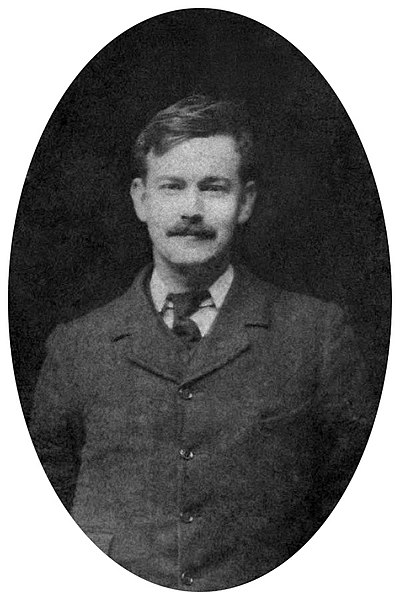|
تضامنًا مع حق الشعب الفلسطيني |
ملف:R. H. Tawney.jpg

الملف الأصلي (600 × 900 بكسل حجم الملف: 101 كيلوبايت، نوع MIME: image/jpeg)
| هذا ملف من ويكيميديا كومنز. معلومات من صفحة وصفه مبينة في الأسفل. كومنز مستودع ملفات ميديا ذو رخصة حرة. |
ملخص
| الوصفR. H. Tawney.jpg |
Richard Henry Tawney Professor of Economic History
'The School was only a part of Tawney’s life as a writer and as a teacher. Despite all the legends of ‘the Squire of Houghton Street’ which accumulated between 1920 and 1949 he was not content to be the conventional academic in universities where many (as he once wrote) ‘make a darkness and call it research, while shrinking from the light of general ideas.’ After leaving Oxford with a Second in Greats (he wrote too slowly for exams; ‘I’m on the floor chewing the doormat’) he found many ways of linking life and learning; to him this was the meaning of education. He found some of these links at Toynbee Hall, as Secretary of the Children’s Country Holiday Fund, learning ‘shovehalfpenny’ at a Workman’s Club, studying poverty at the School on a grant from the Ratan Tata Foundation (which helped to bring into being the Social Administration Department in 1912-3), attending meetings at the ward level of his local Labour Party, consorting with miners and lecturing mine-owners as a member of the Royal Commission on the Coal Mines, serving on the Cotton Trade Conciliation Committee and the Education Committee of the London County Council, and above all, in his work for the W.E.A. which stretched over half a century. Tawney once told me that the fellowship of the W.E.A. has meant more to him than his connections with Labour Party, the School and the Church… He was appointed as a teacher at the School in 1920… and when appointed Professor in 1931 he was given the title but not the salary as part of his time was left free for activities outside the school… ‘Three things,’ he said, ‘have caused me to love the LSE.’ One was the intellectual dynamism. A second was its informal, egalitarian school atmosphere. The last was its sense, derived from Sidney Webb and many others, that the purpose of learning is ultimately to make a juster society –‘the School exists not for itself but for the public.’ Though he retired from the School in 1950 he went on teaching. More than ever it was accompanied by his beloved Coltsfoot tobacco, a mosaic of pipe-ash on the carpet, and much talk about how to reconcile and sustain visionary power and practical action, personal conduct and involvement in social reform.’… IMAGELIBRARY/1105 Persistent URL: archives.lse.ac.uk/dserve.exe?dsqServer=lib-4.lse.ac.uk&a... |
| التاريخ | |
| المصدر |
|
| المؤلف | Library of the London School of Economics and Political Science |
| إصدارات أخرى | أَعمالٌ مُشتقَّة مِن هذا الملفِّ: R. H. Tawney.png |
ترخيص
هذه الصورة مأخوذة من Flickr's The Commons; قد تكون لدى المؤسسة التي تقوم بالرفع أسباب مختلفة لتحديد أنه لا توجد قيود حقوق نشر معروفة موجودة، مثل: No known copyright restrictionsNo restrictionshttps://www.flickr.com/commons/usage/false
يمكن العثور على مزيد من المعلومات في https://flickr.com/commons/usage/. الرجاء إضافة المزيد من وسوم حقوق الطبع والنشر لهذه الصورة إذا أمكن تحديد معلومات أكثر تحديدا عن حالة حقوق الطبع والنشر، انظركومنز:ترخيص لمزيد من المعلومات. |
| Public domainPublic domainfalsefalse |
|
هذا العمل يقع في النَّطاق العامّ في بلد المنشأ وفي البلدان الأخرى والمناطق التي تمتدُّ فيها مدة حقوق التَّأليف والنشر لتغطي زمن حياة المُؤلِّف و 70 سنةً بعد وفاته أو أقل من ذلك.
| |
| هذا الملفُّ مَلحُوظُ بصفته غيرَ مُقيَّدٍ بحقوق التَّأليف والنشر، وهذا يشمل أيضاً الحقوق المُجاوِرة أَو ذات الصلة جميعُها. | |
https://creativecommons.org/publicdomain/mark/1.0/PDMCreative Commons Public Domain Mark 1.0falsefalse
| رَاجَع إِداريٌ أَو مُراجِعٌ هو File Upload Bot (Magnus Manske) هذه الصُّورة المَنشُورة أَصلاً في فلِيكر، بتاريخ August 2, 2011 وأَكد أَنَّها كانت مُتاحةً في الموقع تحت التَّرخيص المَذكُور في ذلك التَّاريخ. |
الشروحات
العناصر المصورة في هذا الملف
يُصوِّر
قيمة ما بدون عنصر ويكي بيانات
١٠ فبراير 2010
تاريخ الملف
اضغط على زمن/تاريخ لرؤية الملف كما بدا في هذا الزمن.
| زمن/تاريخ | صورة مصغرة | الأبعاد | مستخدم | تعليق | |
|---|---|---|---|---|---|
| حالي | 13:34، 2 مارس 2012 |  | 600 × 900 (101 كيلوبايت) | commonswiki>Nagualdesign | Despeckled. |
استخدام الملف
ال1 ملف التالي مكررات لهذا الملف (المزيد من التفاصيل):
- ملف:R. H. Tawney.jpg من ويكيميديا كومنز
الصفحة التالية تستخدم هذا الملف: